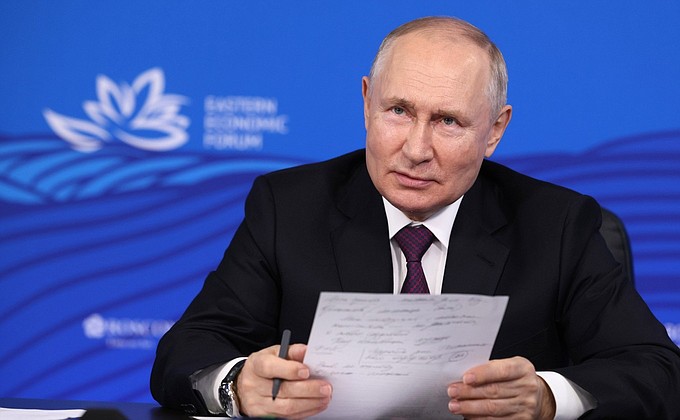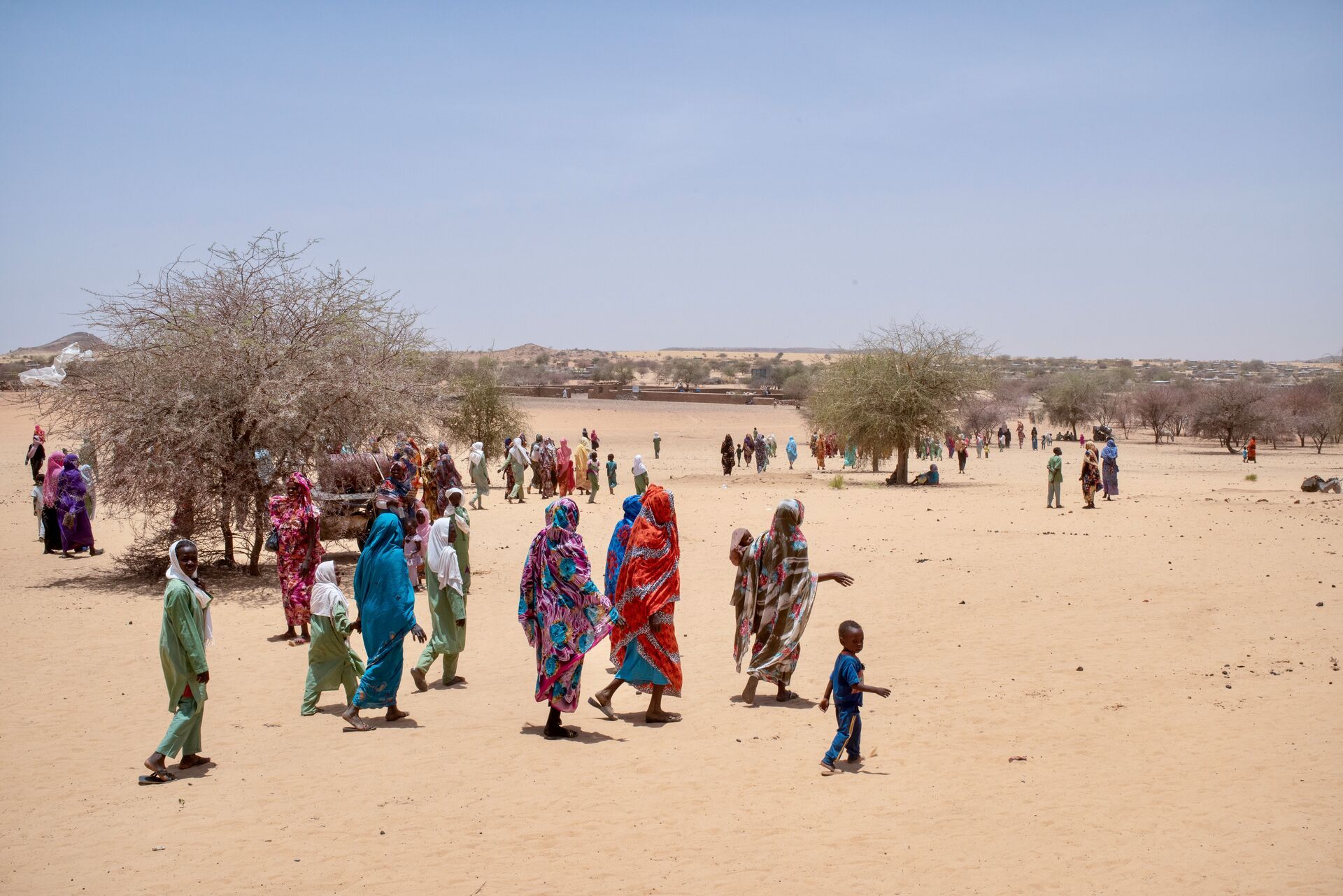
Russian President Vladimir Putin. Photo source Kremlin.
Pyongyang/Moscow/Washington: Ahead of a meeting between North Korean leader Kim Jong Un and Russian President Vladimir Putin, the United States all but called the latter a ”beggar”.
“…you see him travelling across his own country hat in hand to beg Kim Jong-un for military assistance,” Matthew Miller, the US Department Spokesperson, told media persons last night (IST).
When asked how could he conclude that the president of Russia was meeting with the president of North Korea asking for weapons, Miller replied, “I don’t think it’s a social gathering…”
Moscow had yesterday announced that at the invitation of President Putin, Chairman of State Affairs of the Democratic People’s Republic of Korea Kim Jong-un will pay an official visit to Russia “in the coming days”.

Today the official North Korean website Naenara disclosed that actually Kim, accompanied by leading officials of the party, government and armed forces organs, already left Pyongyang on September 10, 2023, by his train, to visit Russia at the invitation of Putin.

Washington described the upcoming Kim-Putin meeting as a meeting between “international pariahs”. Justifying labelling Putin as a pariah, Miller said, “I think Putin’s actions have cemented him as an international pariah. Remember, he has been charged by the ICC with war crimes, was not able to travel to the most recent meeting of the BRICS because of that decision to charge him, did not show up at the G20 meeting, no doubt because he didn’t want to hear from a number of the countries there about the results and the consequences of his actions. So yes, I would absolutely make that assessment”.
The US reminded both countries that any transfer of arms from North Korea to Russia would be in violation of multiple United Nations Security Council resolutions.
Recounting that the US has “aggressively enforced our sanctions against entities that fund Russia’s war effort”, Miller said Washington will continue to enforce those sanctions and will not hesitate to impose new sanctions if appropriate.
“The fact that Russia is having to beg North Korea for military support speaks to the effectiveness of our sanctions and our export controls, that they have been denied the technology they need and the raw materials they need to fund – to sustain this war effort,” he claimed.
When reminded by a journalist that he twice used the word “beg” in the context of Russia, Miller defended his use of the word saying, “I think it’s fair to say this – that having to travel across the length of his own country to meet with an international pariah to ask for assistance in a war that he expected to win in the opening month…”
When asked whether he had any notion or knowledge of what kind of equipment that Russia was “begging” for, he said, “I’m going to wait. Let’s wait and see what the meeting shows.” So what made him think that Putin is actually begging, the US State Department Spokesperson said, “Look, I may – I would characterize it as him begging for assistance”. But what if the meeting turned out to be about “something else”? Miller responded, “We shall see. I will happily eat my words if it turns out to not be, but let’s —”
To another question on how he found out that the Russians didn’t have anything to offer the North Koreans that the North Koreans might want, Miller replied, “Now, we’ll see. There may be something that he offers in exchange. We’ll see when it comes. We’ll monitor it very closely”.
Miller faced a volley of questions from the media persons in this regard. They along with his reply as follows:
Question: Okay. Well, and if there is an exchange, is that – will you still – do you still think that that’s begging?
Miller: Why don’t we wait and see? I’ll wait and see what happens and characterize it after after we see.
Question: No, no, it won’t wait because you already did characterize it like three times.
Miller: Fair enough. Let’s – before we pass any further judgment, let’s wait. I stand by my characterization.
Question:All right. Well, I mean —
Miller: I’ll add any further characterization when we see the outcome of the meeting.
Question: You don’t have – you don’t have any information, or at least information that you can share, about what North Korea might get in return for this assistance.
Miller: No.
A journalist though pointed out to Miller that the US may be wrong in its assessment of the situation to claim that Russia failed strategically given the fact that Russia is holding the territory that it went out to hold, its economy has improved since last year, and the counteroffensive by Ukraine, “by all assessment,” has failed.
The State Department Spokesperson countered such analysis and contended, “I will say first of all, with respect to Russia’s overall strategic failure, you have to remember what Russia’s goals were. Their goals were to take Kyiv; to take the majority, if not all, of the country; and to overthrow the democratically elected government of Ukraine. All of those things have failed. They occupied a certain amount of the country. The Ukrainians have taken back around 50 per cent of the country that Russia occupied at the height of its full-scale invasion”.
Incidentally, on the global platform, the Ukrainian foreign office openly expressed its disappointment with the recently concluded G20 Summit in New Delhi for its stance on Russia’s aggression in Ukraine. In Hanoi (Vietnam), US President Joe Biden was asked this question on September 10, 2023, whether he managed to rally more support or sympathy across the G20, or was this emerging as a wedge issue with the Global South? Biden replied, “It’s not a wedge issue of the Global South. It’s a wedge issue with Russia, which was present, and with China, which was present…”.
Miller last night sought to explain, “First, with respect to the statement, the G20 is a big organization. Russia is a member of the G20; China is a member of the G20. There are members that have a diverse range of views. We believe the fact that that organization was able to issue a statement that calls for respecting territorial integrity and sovereignty and saying that those principles should not be violated is an extremely important statement because that is exactly what is at the heart of Russia’s invasion of Ukraine. It is those very questions. So we thought that was an incredibly important statement for them to make”.
Interestingly, Russian Foreign Minister Sergey Lavrov, who represented his country at the G-20 Summit, interpreted the reference to Ukraine in the G20 Summit Declaration as: “Notably, the Ukraine paragraph is part of the agenda and is a subject of consensus, but it is not about Ukraine. Indeed, it mentions the Ukraine crisis, but only in the context of the importance of resolving all existing global conflicts in accordance with UN Charter goals and principles in their entirety and interrelation. This is important because as soon as Ukraine is mentioned, the West tends to avoid intellectual discussions and demands the cessation of Russian aggression and the restoration of Ukraine’s territorial integrity.”
– global bihari bureau





